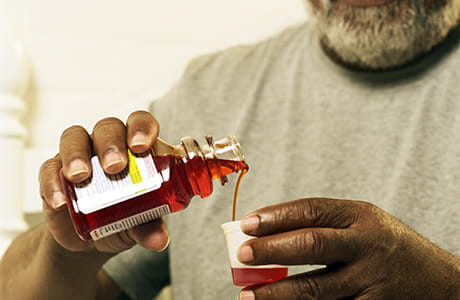How to get rid of a sinus infection
Most sinus infections can be treated at home by managing symptoms.
Do facial pain and tenderness from a sinus infection send you running for medication to find relief? Managing the infection (or its symptoms) is key to avoiding the discomfort that otherwise can drag on for weeks at a time.
“Sinus infections are very common and unfortunately, they can last 10 days or more and bring worse symptoms than the common cold,” says Kyle May, MD, a family medicine provider at Geisinger. “The good news is most sinus infections can be treated at home by managing symptoms and relieving pressure from nasal congestion.”
A sinus infection, also known as sinusitis, is an inflammation of the sinuses. Often, it results from complications from the common cold, flu or even allergies.
When sinuses are healthy, mucus drains easily from the nose to get rid of unwanted dirt and germs. But pathogens, such as viruses, allergens, bacteria or fungi, cause inflammation in the sinus membranes and block mucus from draining. This creates a breeding ground for the pathogen.
Sinus infection symptoms
The telltale sign of a sinus infection is sinus pressure that causes facial pain and tenderness behind the eyes and cheeks. In addition, sinus infections can produce thick yellow or green mucus.
Other common sinus infection symptoms can include:
- Fever and body aches
- Runny nose and post-nasal drip (mucus in the throat)
- Toothaches or ear pressure
- Sore throat
- Headache
- Fatigue
- Loss of taste and smell
- Bad breath
How long do sinus infections last?
Sinus infections can last anywhere from 10 days to several weeks. The length of infection depends on what’s causing your discomfort.
Most sinus infections are caused by viruses and typically resolve on their own in 10 to 14 days. Bacterial sinus infections, however, can last up to four weeks.
“If you have a sinus infection for eight weeks or more, or get more than four a year, contact your doctor,” advises Dr. May. “You could have chronic sinusitis.”
Sinus infection treatments
Just as the duration of a sinus infection depends on what’s causing your discomfort, so too does the treatment. A bacterial sinus infection can be treated with antibiotics, decongestants or prescription intranasal steroids.
“Just be sure to finish the entire course of antibiotics, even if your symptoms improve,” says Dr. May. “Stopping antibiotics early can result in antibiotic resistance or a return of symptoms.”
Viral sinus infections, on the other hand, are best treated at home by managing symptoms, while your body builds up natural immunity and fights off the infection. These treatments are aimed at soothing irritated passageways to promote drainage and relieve sinus pressure.
You can treat symptoms at home by:
Drinking plenty of fluids
Staying hydrated keeps sinuses moist, reducing irritation and thinning mucus for improved drainage.
Getting enough rest
Plenty of sleep gives your body ample time to fight off the infection and speed recovery.
Irrigating sinuses with saline solution
Continually rinsing the sinuses flushes out pathogens and other irritants. Bonus: It moisturizes the nasal passages, reducing inflammation and promoting drainage.
Using a humidifier at night
Adding moisture to the air you breathe can help reduce congestion.
Taking a hot, steamy shower
Breathing in steam or applying a warm compress across your eyes, nose and cheeks helps drain sinuses, relieving facial pain.
Trying over-the-counter medications
Taking acetaminophen or ibuprofen relieves fever, body aches and headaches caused by sinus infections. Cough drops can help with post-nasal drip and sore throats. Antihistamines, if allergies are the culprit, reduce inflammation. Ask your doctor about taking a decongestant, which may help reduce inflammation and improve drainage.
“If your sinus infection lasts more than 10 days, you develop a fever or symptoms seem to improve and then return again, contact your doctor,” says Dr. May. “You may have a bacterial sinus infection, and the sooner a diagnosis can be made, the sooner you can get the care you need to find fast relief.”
Next steps:
Find a primary care provider at Geisinger
Need care today? Try virtual urgent care
How to tell if it’s a cold or a sinus infection





